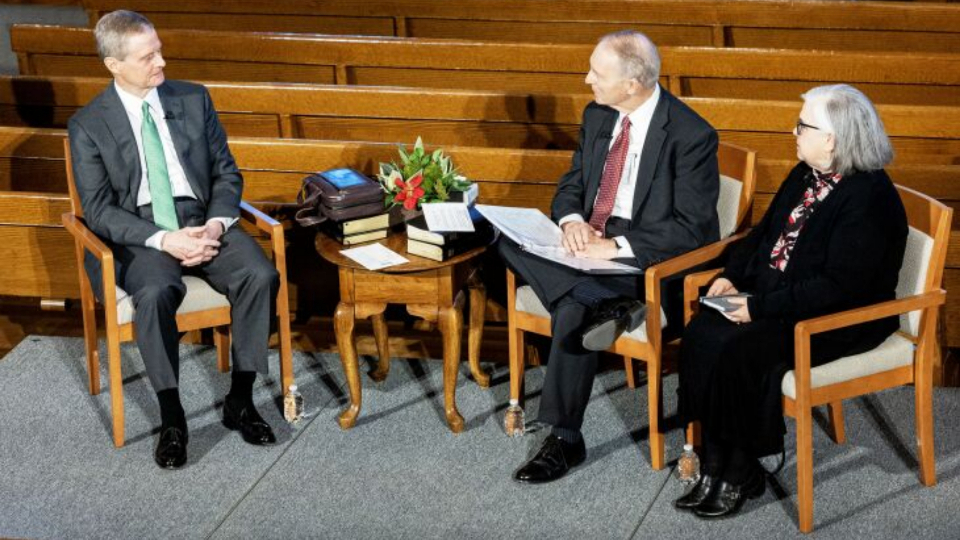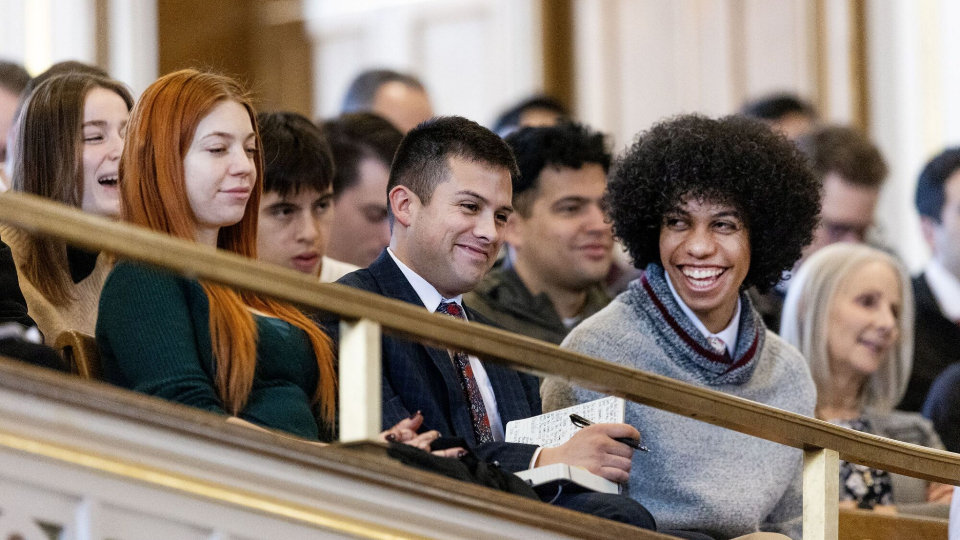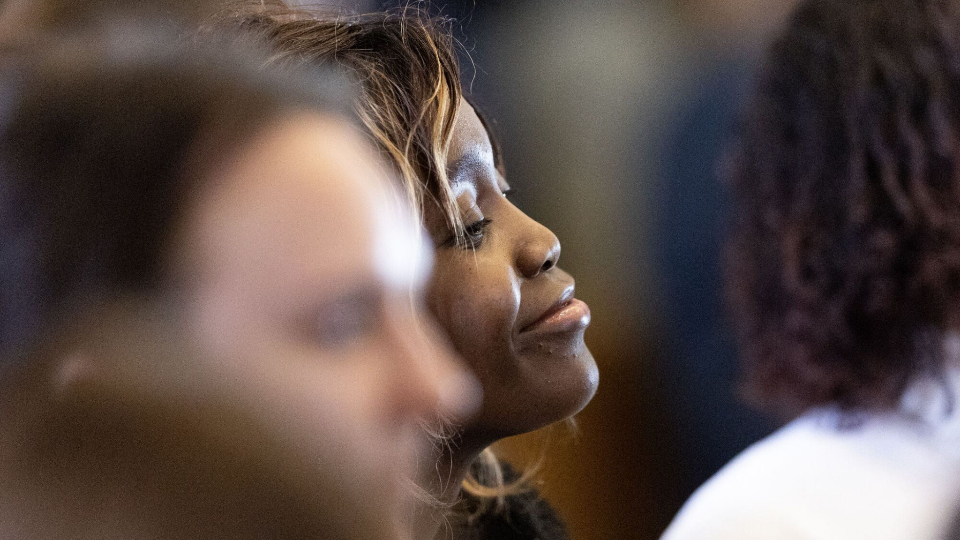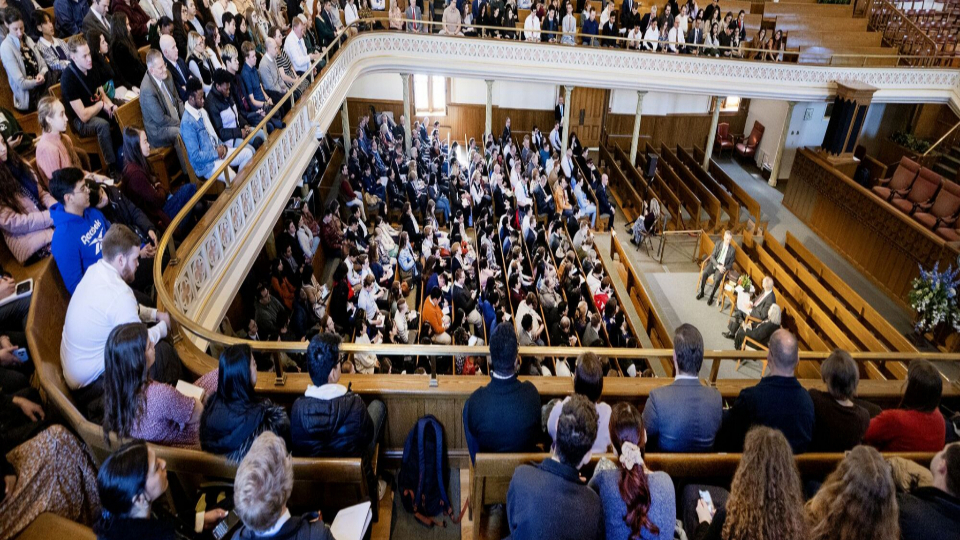- Bednar-Ensign-2023
- Bednar-Ensign-2023
- Bednar-Ensign-2023
- Bednar-Ensign-2023
- Bednar-Ensign-2023
- Bednar-Ensign-2023
- Bednar-Ensign-2023
- Bednar-Ensign-2023
- Bednar-Ensign-2023
- Bednar-Ensign-2023
- Bednar-Ensign-2023
- Bednar-Ensign-2023
- Bednar-Ensign-2023
| Temple Square is always beautiful in the springtime. Gardeners work to prepare the ground for General Conference. © 2012 Intellectual Reserve, Inc. All rights reserved. | 1 / 2 |
This story appears here courtesy of TheChurchNews.com. It is not for use by other media.
By Scott Taylor, Church News
Speaking at a weekly devotional at Ensign College, Elder David A. Bednar of the Quorum of the Twelve Apostles answered questions about change, personal revelation, covenants and balance — and encouraged the students to focus on the promptings and impressions they were receiving from the Holy Ghost instead of on his message.
“Please pay attention to the thoughts that come to your mind and the feelings that come to your heart by the power of the Holy Ghost,” he said in the Tuesday, January 31, gathering at the Assembly Hall on Temple Square.
The 45-minute devotional served as a “conversation,” with Elder Bednar fielding questions from Ensign College President Bruce C. Kusch and his wife, Sister Alynda Kusch.
One of the questions asked was about how to handle the inevitability of change in life. Elder Bednar said the essence of the mortal experience is to not remain the same.
“The natural man and the natural woman dislike and avoid change,” he said. “Men and women of Christ learn to love change and the lessons they learn in the process of being ‘born again.’ One of the fundamental aspects of overcoming the natural man and the natural woman is not resisting change but embracing change and learning from it.”

Bednar-Ensign-2023
Elder David A. Bednar, of the Quorum of the Twelve Apostles, participates in a question-and-answer devotional with Ensign College President Bruce C. Kusch and Sister Alynda Kusch at the Assembly Hall on Temple Square in Salt Lake City on Tuesday, January 31, 2023. Photo by Scott G Winterton, courtesy of Church News.Copyright 2023 Deseret News Publishing Company.A common question Elder Bednar receives is how to discern the Spirit’s influence and receive revelation. He explained that worthy Latter-day Saints “are living in revelation” and will not always recognize inspiration in the moment it occurs. When one worthily partakes of the sacrament and renews covenants each week, one is promised “that we may always have the Spirit to be with us,” he added, paraphrasing the promised blessing from the sacrament prayers (Doctrine and Covenants 20:77, 79).
“If you are honoring your covenants, repenting and pressing forward with faith in the Savior, then you are living in revelation. It does not just come once in a while. You continually are being influenced by the power of the Holy Ghost.”

Bednar-Ensign-2023
Elder David A. Bednar, of the Quorum of the Twelve Apostles, participates in a question-and-answer devotional with Ensign College President Bruce C. Kusch and Sister Alynda Kusch at the Assembly Hall on Temple Square in Salt Lake City on Tuesday, January 31, 2023. Photo by Scott G Winterton, courtesy of Church News.Copyright 2023 Deseret News Publishing Company.
Covenants and Balance
When asked about the importance of covenants, Elder Bednar started by quoting President Russell M. Nelson: “It is doctrinally incomplete to speak of the Lord’s atoning sacrifice by shortcut phrases, such as ‘the Atonement’ … these expressions present a real risk of misdirecting faith by treating the event as if it had living existence and capabilities independent of our Heavenly Father and His Son, Jesus Christ.”
Just as one cannot separate the Atonement from Jesus Christ, one also cannot separate covenants and ordinances from the Savior. “Covenants and ordinances are the means whereby we are connected to the Father and His plan and to the Son and His infinite and eternal atoning sacrifice.”
Accepting the Savior’s invitation to “come unto [Him]” and receiving the covenants and ordinances of His gospel yoke us to and with the Lord. “Not only do we come unto Him, but we walk with Him.” Living and loving covenant commitments creates a connection with the Lord that is deeply personal and spiritually powerful. By honoring the conditions of sacred covenants and ordinances, one gradually and incrementally is drawn closer to Him.
The final question President Kusch posed to Elder Bednar was how to find balance in life. Elder Bednar told his listeners to worry less about finding perfect balance. “There is no such thing as absolute balance — we can only do one thing in any given moment,” he said. The key is focusing one’s limited time and energy on the priorities that really matter the most.
He recalled asking the late Elder Robert D. Hales of the Quorum of the Twelve Apostles what he had learned from going from an active, physically robust life to spending his latter years in a wheelchair and with limited physical capabilities.
“He looked at me and said, ‘David, when you cannot do what you have always done, then you only do what matters most,’” Elder Bednar said. “I hope you will always remember his counsel about priorities.”

Bednar-Ensign-2023
Devotional attendees listen to as Elder David A. Bednar, of the Quorum of the Twelve Apostles, participate in a discussion with Ensign College President Bruce C. Kusch and Sister Alynda Kusch at the Assembly Hall on Temple Square in Salt Lake City on Tuesday, January 31, 2023. Photo by Scott G Winterton, courtesy of Church News.Copyright 2023 Deseret News Publishing Company.
What Students Experienced
Arturo Cristeche of Buenos Aires, Argentina, said Elder Bednar’s analogy of revelation and discernment being like trying to look around a corner resonated with him, with more steps toward the corner resulting in increased, greater perspective.
Cristeche said recent experiences, conversations and decisions have felt revelatory to him. “And that analogy helped me know that those were actually experiences with the Holy Ghost, that it was from God, and that any good impression to do good comes from God. I don’t have to think about it that much, I just have to follow the good impressions.”
Sabrina Moura of Fortaleza, Brazil, said the Holy Ghost confirmed to her during the devotional that prayer is aligning oneself with God. “What stuck into my mind was about how I say a prayer,” she said. “Instead of asking what I want from God, I ask what I should do — what does He want me to do?”
Jorge Bracamontes of Sonora, Mexico, admitted that he, like others, sometimes focuses too much on “trying to get supercharges of spirituality” when seeking inspiration and direction. “But it’s about doing the good things, doing your best — you know that if you’re keeping the commandments and doing what you’re supposed to, everything is going to be OK. And in those times you receive the answer you need, even though you don’t feel that great supercharge spiritually, if you’re doing what’s right, that’s all that matters to God and to you.”

Bednar-Ensign-2023
Devotional attendees listen to as Elder David A. Bednar, of the Quorum of the Twelve Apostles, participate in a discussion with Ensign College President Bruce C. Kusch and Sister Alynda Kusch at the Assembly Hall on Temple Square in Salt Lake City on Tuesday, January 31, 2023. Photo by Scott G Winterton, courtesy of Church News.Copyright 2023 Deseret News Publishing Company.
Conclusion
In his conclusion, Elder Bednar underscored his instruction on personal revelation and the role of the Holy Ghost during the devotional.
“You may have been reassured by the Holy Ghost during our time together,” he said. “You may have thought of a personal weakness, and the Holy Ghost helped you to know that you are doing better than you think. Or you may have recognized an aspect of your life where you are falling short, and the Holy Ghost has prompted you to repent.
“I hope those impressions are what you remember from today — and that you will now go and act upon them.”